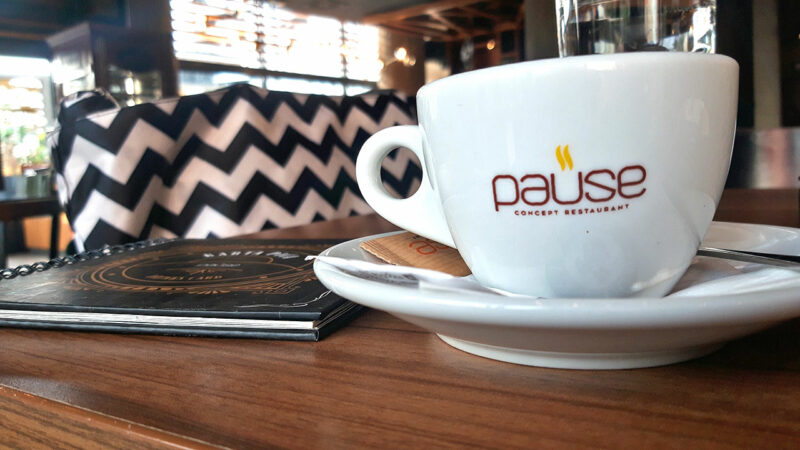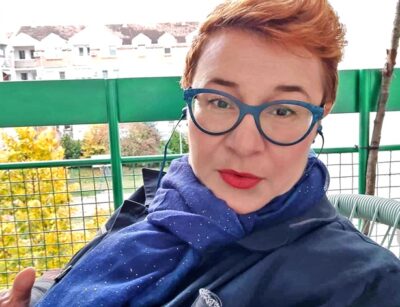This interview first appeared on the VBU Music Registry, a public archive of Macedonian music. An edited version is republished by Global Voices with permission.
Julijana Milutinović, publicly known by her DJ moniker Julls, has been making and hosting radio shows for almost three decades. She started her radio career in some Macedonian radio stations in Skopje, and for the last 16 years, she has been living in Novi Sad, the capital of Vojvodina, the northern autonomous province of Serbia. Currently, she works as an editor and host at the regional public broadcaster Radio Television of Vojvodina, producing two radio shows: Iskorak (“a step forward”) and Makedonium, which features exclusively Macedonian-language music. Julls is also a DJ and identifies as a music lover.
Vasil Buraliev, the founder of the VBU Music Registry, used a recent visit to Novi Sad for a talk with Julls over coffee. He was curious as to whether Macedonian music is popular on the airwaves outside of North Macedonia and whether the Serbian people, as Macedonia's closest neighbours, follow newly produced Macedonian music, besides the Balkan-wide classics and traditional folk songs such as “Jovano, Jovanke” and “Makedonsko devojče”.
Vasil Buraliev (VB): Every Wednesday, the third channel of Radio Television of Vojvodina broadcasts a program in the Macedonian language through the 30-minute show Makedonium. As its editor and host, could you tell us what kind of music is featured in the show? Does the Macedonian air only traditional Macedonian folk music, or does the audience from Vojvodina have opportunities to listen to new music also, such as the works of Funk Shui, Dina Jashari, Tamara, Karolina, Martina Blažeska, Nikolče Miceski, Nokaut, Foltin, Letečki pekinezeri and other current or modern performers and music authors?
Јулијана Милутиновиќ (ЈМ): Кога пред скоро 16 години се воведе програма на македонски јазик на РТВ, се инсистираше на тоа да биде традиционална музика. Првата програма на радиото е на српски јазик, Втората програма на унгарски додека на Третата програма на радиото, се слушаат програми на јазиците на другите националности во Војводина. Тоа се русински, романски, словачки, украински, ромски, буњевачки, хрватски, црногорски, чешки, германски, албански, бугарски, руски и македонски јазик. Со оглед на тоа дека „ние“, малите редакции (мали значи еден до двајца луѓе по редакција или пак се работи за соработка со надворешна продукција на емисиите) имаме многу малку простор во етерот, секогаш е неопходно да се направи добар баланс и со музиката. Но, секако дека имам слобода да пуштам музика по мој избор. Започнав со традиционална поради инсистирањето на традиционалната македонска песна, а би сакала да воведам уште барем една музичка емисија, на македонски јазик, во која сакам да ја презентирам исклучиво модерната македонска музика. Сега за сега таква можност не постои (поради немањето можност за уште еден термин на Третата програма), но имам добра идеја што планирам да ја остварам престојново лето. Верувам дека преку „летната шема“ на програмата ќе можам да го посветам „Македониум“ исклучиво на модерната македонска музика. Би сакала во таа летна шема да го претставам се она што има да го понуди македонската музичка сцена, а има многу да понуди.
Julijana Milutinović (JM): When RTV introduced Macedonian language programming almost 16 years ago, the prerogative was to feature traditional music. The First Channel of the radio is in Serbian language, the Second Channel is in Hungarian, while the Third Channel produces content in the languages of other ethnic communities living in Vojvodina. These languages include Rusyn, Romanian, Slovak, Ukrainian, Czech, German, Albanian, Bulgarian, Russian and Macedonian. Considering that “we” i.e. the small newsrooms (with staff of one to two people per newsroom, or producing shows through cooperation with external production companies) each have have very little slice of the time during the week, it is always necessary to balance informative content with music.
Of course I have the freedom go choose what music to play. At the start I played more traditional Macedonian songs, but now I try to introduce at least one music show in Macedonian language that will present exclusively modern Macedonian music. At the moment there's no time slot for such a show, but I intend to pursue the idea over the summer. I think that “summer scheme” of radio programming would work well as platform for promoting modern Macedonian music within the Makedonium show. The Macedonian music scene has a lot to offer and I intend to introduce it to my audiences.

Panorama of main square in Novi Sad, Vojvodina, Serbia. Photo by Vasil Buraliev, used with permission.
VB: Do coffeehouses and bars in Novi Sad play Macedonian music? Are songs by Macedonian music performers and authors present in other local media in Vojvodina?
ЈМ: Ретко може да се слушне македонска модерна музика во Нови Сад, а и ако може, тоа е кафеана со тамбураши каде евентуално ќе ги отсвират „Македонско девојче“, „Јовано Јованке“, „Елено ќерко“ и „Битола мој роден крај“. Тие им се омилени :) Повозрасната генерација „одлепува“ на Леб и сол, Мизар, Архангел, Анастасија, а помладите така-така. Инаку, генерално новосаѓани го сакаат македонскиот ритам и мелос, македонскиот јазик, неретко ми се случило да ми речат да зборувам повеќе за да уживаат во милозвучноста на нашиот македонски јазик.
JM: Modern Macedonian music is rarely heard in Novi Sad. One can hear traditional songs such as “Makedonsko devojče,” “Jovano, Jovanke,” “Eleno kjerko” and “Bitola moj roden kraj” played by live tambura bands in restaurants. They are their favorites.
The now middle age generation really likes Leb i sol, Mizar, Arhangel, Anastasija [alternative bands popular around the time of Yugoslavia], while the attitude of younger people is ambivalent. In general the citizens of Novi Sad like Macedonian rhythm and melodies/music styles, and in many cases they would ask me to speak in Macedonian with them so they can enjoy the sound of our language.
The following video shows that a coffee bar in Novi Sad played the song “Mamurni ljudi” (People with a hangover) by Macedonian rock group Leb i sol during the interview.
VBU: Traditionally, every May, there's an annual celebration, Days of Macedonian Culture in Serbia. How is this handled in Novi Sad? Do they include music events like concerts of Macedonian artists?
ЈМ: Деновите на македонската култура во Нови Сад, ги организира здружението на Македонците од Нови Сад, „Кирил и Методиј“. Секоја година се организира свечена академија со пригодна програма во чест на просветителите чие име го носи ова здружение. Се организираат литературни, поетски, музички, уметнички вечери од здружението, а со поддршка од Националниот совет на македонското национално малцинство, чие седиште е во Панчево. Доаѓаат македонски поети, сликари, уметници на тие вечери, а најчесто настапуваат групи, пејачки ансамбли и уметници кои се од Војводина. Тие настапуваат со репертоар од македонската традиционална како и класична музика.
JM: The Days of Macedonian Culture in Novi Sad are organized by the Association of Macedonians in Novi Sad named “Cyril and Methodius.” Every year they organize a Solemn Academy in honor of the patron enlighteners. They also organize evenings of literature, poetry, music, visual arts with support of the National Council of Macedonian National Minority, situated in Pančevo. Alongside visiting poets, painters or artists, these evenings include performances by local music groups or artists, often playing Macedonian traditional and classical music.
VBU: You also have an extensive career as a DJ. Does your playlist include songs from the Macedonian music production?
ЈМ: Во мојот репертоар понекогаш има македонска музика, или барем ремикси што ги создаваат наши продуценти. Јас сум вљубеник во постарата музика, па неретко се случува да ги пуштам КИМ бенд (KIM Band). Од поновата продукција многу ми се допаѓаат Лилит (Lilit), бидејќи се фанки и соулфул, она што јас лично го претпочитам како стил.
JM: My repertoire sometimes includes Macedonian music, or remixes by Macedonian producers. I love some of the older kinds of music so I often play KIM Band. From new bands I prefer Lilit, because they are funky and soulful, which is my favorite style.
VB: Which Macedonian songs and performers are your favourites and why?
ЈМ: Ох, колку тешко прашање. КИМ бенд, апсолутно се! Зошто? Заради тоа што тие го измислиле есид џезот пред Британците да го воведат како стил на музика. Сите шлагери од македонските фестивали од 70/80 ги сакам! Од Македонија Тамара Тодевска е пејачката што највеќе уживам да ја слушам. Секако не смеам да ја заборавам и Каролина Гочева. Крсто (Кристо) Роџевски е еден од уметниците кои ги ценам. Владимир Четкар исто така го ценам, особено заради тоа што стилски неговата музика најмногу ми лежи. Фанк Шуи (Funk Shui) се феноменални. Дина Јашари (Dina Jashari) е уште едно од имињата кое ме одушеви како и Марија Димитриевиќ и нејзините џез изданија и пеење. Омилена песна ми се чини немам, но да ме прашавте и за омилена песна на друг јазик немаше да го знам одговорот. Има толку многу преубава музика, што ми се чини дека е греота да се детерминираме со еден или пет наслови.
JM: Oh this is a very hard question. One such performer are the KIM Band! Why? Because they invented acid jazz way before the Britons officially introduced it as a music style. I also love all the Schlagers from the festivals in the 1970s and 1980s. I simply enjoy listening to Tamara Todevska. I must not forget Karolina Gočeva also. And I appreciate the art of Kristo Rodzevski.
I hold Vladimir Četkar in high esteem as well, especially because the style of his music agrees with my personal taste. Funk Shui are phenomenal. Young alternative signer/songwriter Dina Jashari has impressed me, as did the jazz performances of Marija Dimitriević. I don't have one most favorite Macedonian song, but I would answer the same about a favorite song in any other language. There's so much beautiful music out there and at our disposal, so it would be almost sinful to limit oneself to one or five tracks only.









